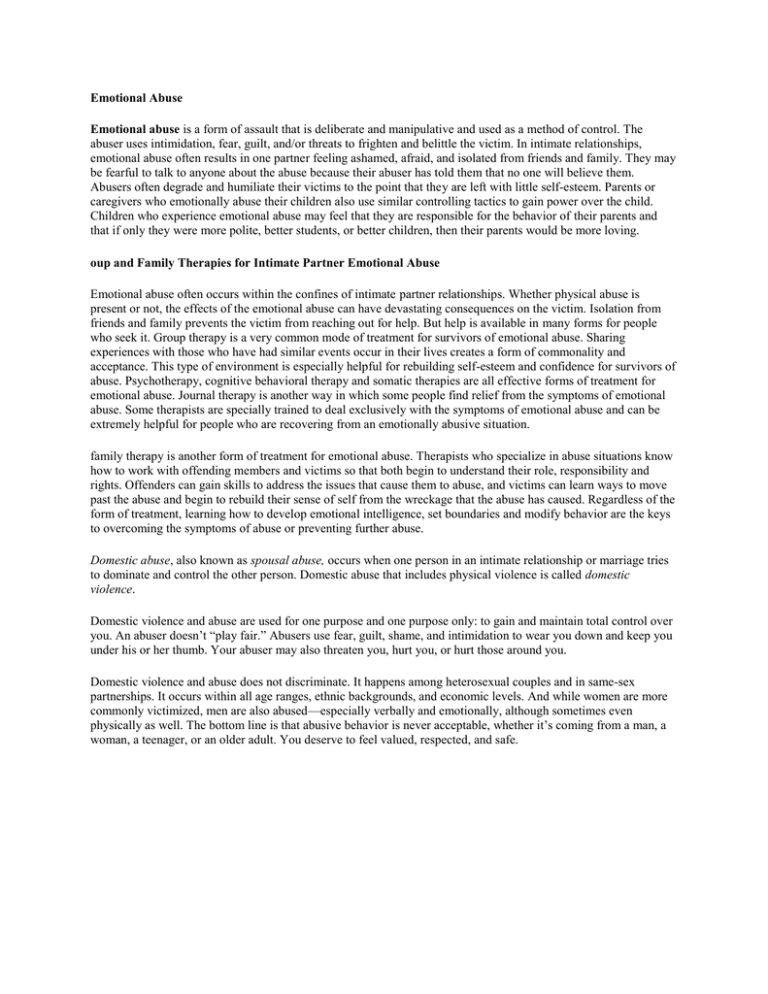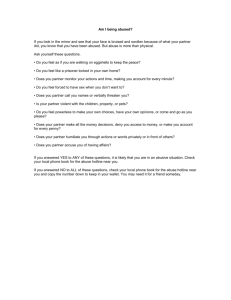
Emotional Abuse
Emotional abuse is a form of assault that is deliberate and manipulative and used as a method of control. The
abuser uses intimidation, fear, guilt, and/or threats to frighten and belittle the victim. In intimate relationships,
emotional abuse often results in one partner feeling ashamed, afraid, and isolated from friends and family. They may
be fearful to talk to anyone about the abuse because their abuser has told them that no one will believe them.
Abusers often degrade and humiliate their victims to the point that they are left with little self-esteem. Parents or
caregivers who emotionally abuse their children also use similar controlling tactics to gain power over the child.
Children who experience emotional abuse may feel that they are responsible for the behavior of their parents and
that if only they were more polite, better students, or better children, then their parents would be more loving.
oup and Family Therapies for Intimate Partner Emotional Abuse
Emotional abuse often occurs within the confines of intimate partner relationships. Whether physical abuse is
present or not, the effects of the emotional abuse can have devastating consequences on the victim. Isolation from
friends and family prevents the victim from reaching out for help. But help is available in many forms for people
who seek it. Group therapy is a very common mode of treatment for survivors of emotional abuse. Sharing
experiences with those who have had similar events occur in their lives creates a form of commonality and
acceptance. This type of environment is especially helpful for rebuilding self-esteem and confidence for survivors of
abuse. Psychotherapy, cognitive behavioral therapy and somatic therapies are all effective forms of treatment for
emotional abuse. Journal therapy is another way in which some people find relief from the symptoms of emotional
abuse. Some therapists are specially trained to deal exclusively with the symptoms of emotional abuse and can be
extremely helpful for people who are recovering from an emotionally abusive situation.
family therapy is another form of treatment for emotional abuse. Therapists who specialize in abuse situations know
how to work with offending members and victims so that both begin to understand their role, responsibility and
rights. Offenders can gain skills to address the issues that cause them to abuse, and victims can learn ways to move
past the abuse and begin to rebuild their sense of self from the wreckage that the abuse has caused. Regardless of the
form of treatment, learning how to develop emotional intelligence, set boundaries and modify behavior are the keys
to overcoming the symptoms of abuse or preventing further abuse.
Domestic abuse, also known as spousal abuse, occurs when one person in an intimate relationship or marriage tries
to dominate and control the other person. Domestic abuse that includes physical violence is called domestic
violence.
Domestic violence and abuse are used for one purpose and one purpose only: to gain and maintain total control over
you. An abuser doesn’t “play fair.” Abusers use fear, guilt, shame, and intimidation to wear you down and keep you
under his or her thumb. Your abuser may also threaten you, hurt you, or hurt those around you.
Domestic violence and abuse does not discriminate. It happens among heterosexual couples and in same-sex
partnerships. It occurs within all age ranges, ethnic backgrounds, and economic levels. And while women are more
commonly victimized, men are also abused—especially verbally and emotionally, although sometimes even
physically as well. The bottom line is that abusive behavior is never acceptable, whether it’s coming from a man, a
woman, a teenager, or an older adult. You deserve to feel valued, respected, and safe.
Signs of an abusive relationship
There are many signs of an abusive relationship. The most telling sign is fear of your partner. If
you feel like you have to walk on eggshells around your partner—constantly watching what you
say and do in order to avoid a blow-up—chances are your relationship is unhealthy and abusive.
Other signs that you may be in an abusive relationship include a partner who belittles you or tries
to control you, and feelings of self-loathing, helplessness, and desperation.
To determine whether your relationship is abusive, answer the questions below. The more “yes”
answers, the more likely it is that you’re in an abusive relationship.
Physical abuse and domestic violence
When people talk about domestic violence, they are often referring to the physical abuse of a
spouse or intimate partner. Physical abuse is the use of physical force against someone in a way
that injures or endangers that person. Physical assault or battering is a crime, whether it occurs
inside or outside of the family. The police have the power and authority to protect you from
physical attack.
Sexual abuse is a form of physical abuse
Any situation in which you are forced to participate in unwanted, unsafe, or degrading sexual
activity is sexual abuse. Forced sex, even by a spouse or intimate partner with whom you also
have consensual sex, is an act of aggression and violence. Furthermore, people whose partners
abuse them physically and sexually are at a higher risk of being seriously injured or killed.
Emotional abuse: It’s a bigger problem than you think
When people think of domestic abuse, they often picture battered women who have been
physically assaulted. But not all abusive relationships involve violence. Just because you’re not
battered and bruised doesn’t mean you’re not being abused. Many men and women suffer from
emotional abuse, which is no less destructive. Unfortunately, emotional abuse is often minimized
or overlooked—even by the person being abused.
Understanding emotional abuse
The aim of emotional abuse is to chip away at your feelings of self-worth and independence. If
you’re the victim of emotional abuse, you may feel that there is no way out of the relationship or
that without your abusive partner you have nothing.
Emotional abuse includes verbal abuse such as yelling, name-calling, blaming, and shaming.
Isolation, intimidation, and controlling behavior also fall under emotional abuse. Additionally,
abusers who use emotional or psychological abuse often throw in threats of physical violence or
other repercussions if you don’t do what they want.
You may think that physical abuse is far worse than emotional abuse, since physical violence can
send you to the hospital and leave you with scars. But, the scars of emotional abuse are very real,
and they run deep. In fact, emotional abuse can be just as damaging as physical abuse—
sometimes even more so.





